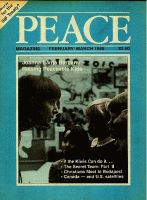Letters
By Louis-Claude Desjardins, Hania Fedorowicz, Kim Goldberg, Cecil Stedman, Joan Hadrill | 1988-02-01 12:00:00
Un Début Encourageant
Je m'appelle Louis-Claude Desjardins. J'ai 14 ans et je suis en secondaire 3 au campus de st-Foy à st-Foy (proche de Québec).
Pour commencer je vous dirai que je suis totalement contre toutes armes nucléaires. Au moins d'août dernier je suis allé rencontrer la deputeé Federale de mon compté soit mme Suzanne Duplessis pour des armes nucléaires et de ce que j'en pensais. Voilà que la semaine dernière soit mardi le 20 octobre je reçois de mme Duplessis un exposé des activités nationales et internationales en matière de désarmement et de contrôle des armements.
J'ai aussi écris au premier ministre Mr. Brian Mulroney pour lui parler a lui aussi de l'armement nucléaire et de ce que j'en pensais. Voici ce qu'il m'a répondu suite à ma lettre.
Je crois que cette lettre est digne d'un politicien, c'est la manière polie de dire: "Qu'est-ce tu veux que je fasses?" Mais c'est quand mème un début et un début plutôt encourageant.
Pour toutes ces raisons et parce que je tiens à la vie sur terre j'aimerais me joindre à l'organisme CANDIS. Je crois qu'il faut faire des pressions constantes et avoir des preuves concrètes pour accelerer le processus du désarmement .
Louis-Claude Desjardins, Sillery, Québec
Include Human Rights
How ironic that David Langille considers the peace movement to be "maturing," yet fails to understand the logical necessity of a human rights analysis for peace work. ("Therefore, while the peace movement as a whole should remain concerned about human rights, only a few groups can be expected to make this their campaign priority.")
Canadian defence policy and procurement priorities such as the purchase of nuclear-powered submarines are made without public review. Military contracts and exports are shrouded in secrecy. Public will for a real disarmament posture for Canada is treated by the Department of External Affairs and National Defence as a public relations problem. And the legal basis for allowing nuclear vessels' port visits to Canada will not be revealed by officials. These all strike me as a limitation on the political rights of Canadians. A peace movement which hopes to make a difference in Canadian policy would be well advised to challenge such limitations in our democratic process. In this regard, honesty and transparency of government decision-making should be peace issues.
It's time the peace movement in Canada took off the dainty gloves and got into the political realities of what kind of democracy we live in. Much as I sympathize with the Canadian Peace Pledge Campaign, I fail to hear any analysis of how political parties control policy (not M.P.s), of how members of Cabinet relate to their party's policies, of the economic and diplomatic pressures constraining even a well-intentioned party once it is in power.
Without a vision of how human rights inform the political process, peace activists risk marginality instead of becoming legitimate political partners for ruling elites. Such a vision would challenge systemic limits on citizens' rights rather than merely comparing platforms of different candidates.
Hania Fedorowicz, Ottawa
Conference Not Too Rigid
I was disappointed to read Ann Crosby's assessment of the World Congress of Women (PEACE Magazine, Oct/Nov) which convened in Moscow in June. I, too was there and came away with a very different impression.
Crosby's main complaint seems to be that WCW didn't move beyond naming the problem and assigning blame because of a rigid structure that inhibited dialogue. That is true of the eight formal commissions, but they were only one type of many forums available to the 2,800 women from 154 nations during the five-day gathering.
In the more than 200 workshops, seminars and discussion groups, the dialogue was genuine and focused on problem solving rather than blaming. Following the screening of Vivienne Verdon-Roe's Women for America for the World, delegates responded with many action-oriented strategies: a call for women teachers and staff at American colleges and universities to refuse work with military applications; a plan for women in all countries to stymie the war toys industry by buying up war toys before Christmas and then returning them for a refund after Christmas; a pledge from the Soviet Women's Committee to have Verdon-Roe's film shown on Soviet television.
Even in the highly formal commissions, some action-oriented strategies were put forth: an Iranian woman urged women in all developed countries to pressure their governments to cut military links with Iran and Iraq; a Greenham Common woman lauded nonviolent direct action as the movement's most effective tool.
As a result of WCW I am now corresponding with three different Soviet women. None of them is a member of the Soviet Peace Committee or the Soviet Women's Committee or the Communist Party. They are ordinary women like myself who want to counteract Cold War thinking at an individual level.
Kim Goldberg, Nanaimo, B.C.
Soviets Not the Adversary
I take exception to the article "Canada's Uranium Transfers to the Soviet Union,"(Oct/Nov p. 10) in which the writer refers to the Soviet Union as our "adversary." If war breaks out between them and the USA then, like it or not, we will perforce be an adversary of the Soviet Union. At present we are not. In my opinion it is equally reprehensible under present circumstances to supply uranium to either the USA or the USSR.
Cecil Stedman, New Denver, B.C.
Fan Mail
We can't let the PEACE MAGAZINE die for lack of funds. What would we in the peace community do without it? It's the best we have in Canada and it's the only publication which covers all the issues and events in Canada. Here is my donation. Shalom.
Joan Hadrill, Beaconsfield, Québec
